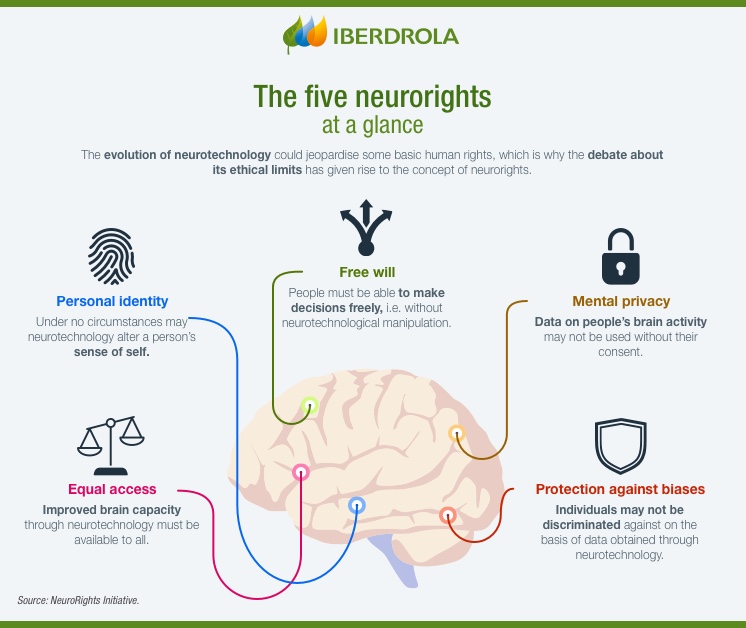Neurorights
What are neurorights and why are they vital in the face of advances in neuroscience?
The progress of neuroscience and, in parallel, of neurotechnology is unstoppable. Over the coming decades we will see, even if it sounds like science fiction, devices capable of decoding information in our brains, amplifying our senses or modifying our memories. Which is where ethical boundaries come into play and, in this sense, neurorights are essential if we are to protect our mental privacy.

In 2019, neuroscientist Rafael Yuste, director of the Center for Neurotechnology at Columbia University (USA) and the main driving force behind the BRAIN project, published an experiment in which, using electrodes implanted in the brains of rats, he was able to make the animals see things that were not actually there. In other words, the researchers were controlling their brain activity. According to Yuste and other scientists around the world, it is only a matter of time before something similar can be done with human beings, which is why it is urgent to define and recognise people's neurorights.
Neuroscience and privacy
Deep brain stimulation using electrodes implanted in the brain is a breakthrough in the field of biotechnology that has already been used successfully to improve the symptoms of people suffering from Parkinson's disease or epilepsy, for example. Elon Musk's Neuralink project, for example, goes one step further: its aim is to develop a bidirectional interface capable not only of stimulating parts of the brain, but also of receiving and interpreting the signals coming from it.
Once this connection is established, and through the use of artificial intelligence, it would be possible to identify emotions, control devices or induce different states. Some scientists believe that a highly sophisticated future version of this or a similar system could read a person's thoughts, access their memory and even control both, which they see as a potential danger to humanity.
The analysis of this information through big data techniques and the ability to influence people would provide tools for so-called neuromarketing, inducing them to make certain purchases. But it could also be applied to other more sensitive areas, such as politics, affecting voting and therefore violating basic human rights. For these and other reasons, neurorights are not science fiction, but a real and present need.
What are neurorights
Neurorights can be defined as a new international legal framework for human rights specifically aimed at protecting the brain and its activity as neurotechnology advances. The concept has been developed by the NeuroRights Initiative External link, opens in new window., a platform led by the aforementioned Columbia University in New York and driven by an international community of neuroscientists.
External link, opens in new window., a platform led by the aforementioned Columbia University in New York and driven by an international community of neuroscientists.
Neurotechnology is any technology that records information from or interferes with brain activity. Combined with artificial intelligence, it has the potential to fundamentally alter society, say the scientists behind the initiative. The organisation's work therefore focuses on developing a code of ethics for scientists who work within neurotechnology and on the international recognition of the five neurorights.
The five neurorights
The NeuroRights Initiative platform sets out the following five neurorights:

SEE INFOGRAPHIC: The five neurorights at a glance [PDF] External link, opens in new window.
These are discussed in more detail below:
 Personal identity
Personal identity
This consists of limiting any neurotechnology that would alter a person's sense of self and preventing personal identity from being lost through connection to external digital networks.
 Free will
Free will
This refers to preserving people's ability to make decisions freely and autonomously, that is, without any manipulation or influence mediated by neurotechnologies.
 Mental privacy
Mental privacy
This protects individuals from the use of data obtained during the measurement of their brain activity without their consent and expressly prohibits any commercial transaction involving this data.
 Equal access
Equal access
This seeks to regulate the application of neurotechnologies to increase brain capacities, so that they are not only available to a few and do not generate inequality in society.
 Protection against biases
Protection against biases
This prevents people from being discriminated against on the basis of any factor, such as a mere thought, that can be obtained through the use of neurotechnologies.
Neurorights in the world
In recent years, the cause of neurorights has made progress in several parts of the world. Chile was the first country in the world to approve an amendment to its constitution to include digital rights and the protection of "mental integrity" in the face of advancing neurotechnologies. Many other countries are embracing e-rights in a context of digital transformation in order to put people at the centre of the process.
For its part, the NeuroRights Initiative has proposed a kind of Hippocratic Oath, similar to that taken by doctors around the world in their commitment to protect their patients, but applied to companies. The aim is to secure a commitment to ensure that digital advances do not interfere with neurorights and this has focused on the acceptance of such an oath by the world's leading technology companies, such as Facebook and Google, among others.
At the international level, the OECD has made a series of declarations included in the "Recommendation on Responsible Innovation in Neurotechnology", while the Council of Europe has drawn up the "Strategic Action Plan", focusing on human rights and new biomedical technologies, which includes precisely the new changes in neurotechnology.




